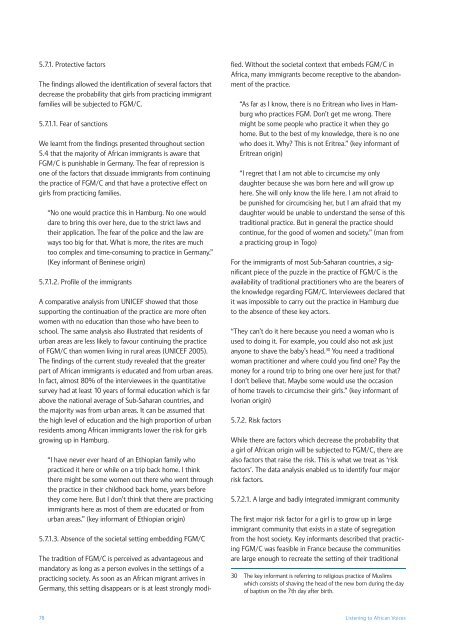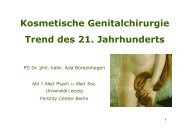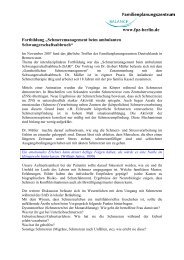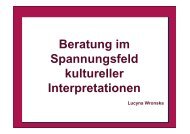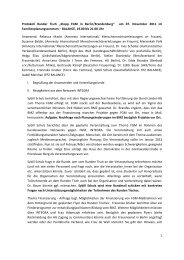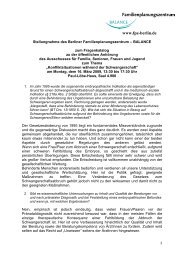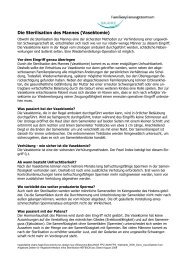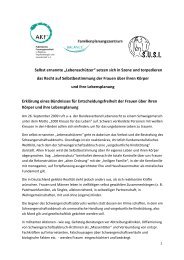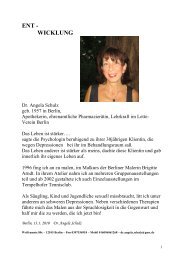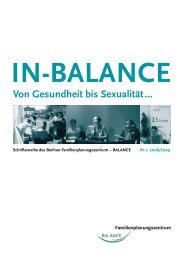The main part of the data indicate that the answer <strong>to</strong> thefirst question is “no”. There were only four intervieweeswho believed or had heard that FGM/C was taking place inHamburg or other parts of Germany. Three of the intervieweesreferred <strong>to</strong> the Nigerian, Somalian and Eritrean communities.The anecdotes provided open doors for speculation,but were unspecific, lacked concrete details and need furtherinvestigation:• Two sources were members of the Nigerian community:one man and one woman reported the possibility thatgirl infants of Igbo origin are subjected <strong>to</strong> the practice inHamburg (see section 5.5.3.3). These cases might includea type IV (non classified) procedure which consists of searingthe cli<strong>to</strong>ris and adjacent tissue with a <strong>to</strong>wel soaked inboiling water.• The other source was a gynaecologist of Eritrean originwho had heard that traditional practitioners of Eritreanand Somalian origin had been fl own <strong>to</strong> Kassel and Frankfurt<strong>to</strong> carry out FGM/C on daughters within immigrantscommunities of the two countries.• The last source was a German gynaecologist who hadheard of the existence of two traditional woman practitionersof unknown origin in Berlin.All the other <strong>African</strong> key informants were convinced thatFGM/C was not carried out in Hamburg or other parts ofGermany. Most of them were even surprised by the questionand considered it <strong>to</strong> be something that had never crossedtheir minds:“People from my country? Are they doing here? In thiscountry? I cannot imagine that. Maybe in Africa but nothere.” (man of Senegalese origin)But the nonexistence or rarity of FGM/C in Hamburg,does not exclude the possibility that girls of <strong>African</strong> originare subjected <strong>to</strong> the practice of FGM/C outside Germany.The key informants pointed out two possible approachesthat might be used by families who intend <strong>to</strong> have theirdaughters undergo FGM/C. The fi rst one was <strong>to</strong> send thedaughter back <strong>to</strong> the country of origin for a stay with theextended family.“If you would want <strong>to</strong> do it while living here, it is better<strong>to</strong> go back <strong>to</strong> your country or <strong>to</strong> go <strong>to</strong> France and do itthere clandestinely. The European media have created astrong fear of going <strong>to</strong> a doc<strong>to</strong>r here and asking for it.You would have <strong>to</strong> fear immediately repressive charges.The best solution is <strong>to</strong> go back <strong>to</strong> your country and do itthere.” (key informant of Senegalese origin)“If a family wants <strong>to</strong> circumcise a daughter, they will sendher back <strong>to</strong> Africa. They tell her that she is going <strong>to</strong> spendthe holidays in Africa, <strong>to</strong> see her grandmother, the grandfather,uncles… the extended <strong>African</strong> family. Now, if thereare cousins who have <strong>to</strong> go through the same thing, theywill make a plan on how <strong>to</strong> circumcise the girl <strong>to</strong>getherwith them. If she is of the same age as the other girls, shewill simply be obliged <strong>to</strong> go without asking her opinion.This is how things would be done!” (key informant ofIvorian origin)The second scenario was <strong>to</strong> send the girl <strong>to</strong> another Europeancountry, notably <strong>to</strong> France or Italy. Several sources confidedthat FGM/C is practiced by communities of Senegalese,Malian, Guinean and Ivorian origin in these two countries.The practicing <strong>African</strong> communities are well organised andcarry out FGM/C in <strong>to</strong>tal secrecy. One participant fromGuinea, for example, shared the fact that her brother hadrecently subjected his three daughters <strong>to</strong> FGM/C in Paris.Others pointed out the existence of traditional practitionersin France.“Do it here? That would be difficult. The family would go<strong>to</strong> Africa with the child or <strong>to</strong> France. In France, you canfind women who take care of that. They have learnt <strong>to</strong>do it in Mali. In Hamburg, there is no such possibility. Theperpetra<strong>to</strong>rs are not organised in that sense. There arenot many <strong>African</strong>s here.” (key informant of Ivorian origin)Although the two approaches were mentioned by numerouskey informants, they also pointed out that both scenarios arerather uncommon. First of all, a considerable proportion ofimmigrants lack the financial means <strong>to</strong> take their daughtershome on holiday. But mostly, they fear that:• the act could be discovered during medical controls,examinations or treatments,• the Social Services or teachers could ask for a medicalcheck up after a stay in a home country or that• the girls could talk about the experience in school or inpresence of Germans.The conclusion among the researchers was that if a girl wassent back <strong>to</strong> Africa <strong>to</strong> undergo the practice, then she wouldprobably stay there for a longer period of time than justa holiday season. Incidentally, it is an established practiceamong <strong>African</strong> immigrants <strong>to</strong> send their children – boys andgirls alike – for a period of several years <strong>to</strong> their country oforigin <strong>to</strong> have them receive a traditional <strong>African</strong> educationand <strong>to</strong> get <strong>to</strong> know their family and culture. In the course ofthese prolonged stays, young girls from practicing familiesare evidently at risk of undergoing FGM/C. The data doesnot furnish information, however, on how common it is <strong>to</strong>send girl children for extended stays <strong>to</strong> Africa for educationalreasons.<strong>Listening</strong> <strong>to</strong> <strong>African</strong> <strong>Voices</strong> 77
5.7.1. Protective fac<strong>to</strong>rsThe findings allowed the identification of several fac<strong>to</strong>rs thatdecrease the probability that girls from practicing immigrantfamilies will be subjected <strong>to</strong> FGM/C.5.7.1.1. Fear of sanctionsWe learnt from the findings presented throughout section5.4 that the majority of <strong>African</strong> immigrants is aware thatFGM/C is punishable in Germany. The fear of repression isone of the fac<strong>to</strong>rs that dissuade immigrants from continuingthe practice of FGM/C and that have a protective effect ongirls from practicing families.“No one would practice this in Hamburg. No one woulddare <strong>to</strong> bring this over here, due <strong>to</strong> the strict laws andtheir application. The fear of the police and the law areways <strong>to</strong>o big for that. What is more, the rites are much<strong>to</strong>o complex and time-consuming <strong>to</strong> practice in Germany.”(Key informant of Beninese origin)5.7.1.2. Profile of the immigrantsA comparative analysis from UNICEF showed that thosesupporting the continuation of the practice are more oftenwomen with no education than those who have been <strong>to</strong>school. The same analysis also illustrated that residents ofurban areas are less likely <strong>to</strong> favour continuing the practiceof FGM/C than women living in rural areas (UNICEF 2005).The findings of the current study revealed that the greaterpart of <strong>African</strong> immigrants is educated and from urban areas.In fact, almost 80% of the interviewees in the quantitativesurvey had at least 10 years of formal education which is farabove the national average of Sub-Saharan countries, andthe majority was from urban areas. It can be assumed thatthe high level of education and the high proportion of urbanresidents among <strong>African</strong> immigrants lower the risk for girlsgrowing up in Hamburg.“I have never ever heard of an Ethiopian family whopracticed it here or while on a trip back home. I thinkthere might be some women out there who went throughthe practice in their childhood back home, years beforethey come here. But I don’t think that there are practicingimmigrants here as most of them are educated or fromurban areas.” (key informant of Ethiopian origin)5.7.1.3. Absence of the societal setting embedding FGM/CThe tradition of FGM/C is perceived as advantageous andmanda<strong>to</strong>ry as long as a person evolves in the settings of apracticing society. As soon as an <strong>African</strong> migrant arrives inGermany, this setting disappears or is at least strongly modified.Without the societal context that embeds FGM/C inAfrica, many immigrants become receptive <strong>to</strong> the abandonmen<strong>to</strong>f the practice.“As far as I know, there is no Eritrean who lives in Hamburgwho practices FGM. Don’t get me wrong. Theremight be some people who practice it when they gohome. But <strong>to</strong> the best of my knowledge, there is no onewho does it. Why? This is not Eritrea.” (key informant ofEritrean origin)“I regret that I am not able <strong>to</strong> circumcise my onlydaughter because she was born here and will grow uphere. She will only know the life here. I am not afraid <strong>to</strong>be punished for circumcising her, but I am afraid that mydaughter would be unable <strong>to</strong> understand the sense of thistraditional practice. But in general the practice shouldcontinue, for the good of women and society.” (man froma practicing group in Togo)For the immigrants of most Sub-Saharan countries, a significantpiece of the puzzle in the practice of FGM/C is theavailability of traditional practitioners who are the bearers ofthe knowledge regarding FGM/C. Interviewees declared thatit was impossible <strong>to</strong> carry out the practice in Hamburg due<strong>to</strong> the absence of these key ac<strong>to</strong>rs.“They can’t do it here because you need a woman who isused <strong>to</strong> doing it. For example, you could also not ask justanyone <strong>to</strong> shave the baby’s head. 30 You need a traditionalwoman practitioner and where could you find one? Pay themoney for a round trip <strong>to</strong> bring one over here just for that?I don’t believe that. Maybe some would use the occasionof home travels <strong>to</strong> circumcise their girls.” (key informant ofIvorian origin)5.7.2. Risk fac<strong>to</strong>rsWhile there are fac<strong>to</strong>rs which decrease the probability thata girl of <strong>African</strong> origin will be subjected <strong>to</strong> FGM/C, there arealso fac<strong>to</strong>rs that raise the risk. This is what we treat as ‘riskfac<strong>to</strong>rs’. The data analysis enabled us <strong>to</strong> identify four majorrisk fac<strong>to</strong>rs.5.7.2.1. A large and badly integrated immigrant communityThe first major risk fac<strong>to</strong>r for a girl is <strong>to</strong> grow up in largeimmigrant community that exists in a state of segregationfrom the host society. Key informants described that practicingFGM/C was feasible in France because the communitiesare large enough <strong>to</strong> recreate the setting of their traditional30 The key informant is referring <strong>to</strong> religious practice of Muslimswhich consists of shaving the head of the new born during the dayof baptism on the 7th day after birth.78<strong>Listening</strong> <strong>to</strong> <strong>African</strong> <strong>Voices</strong>


